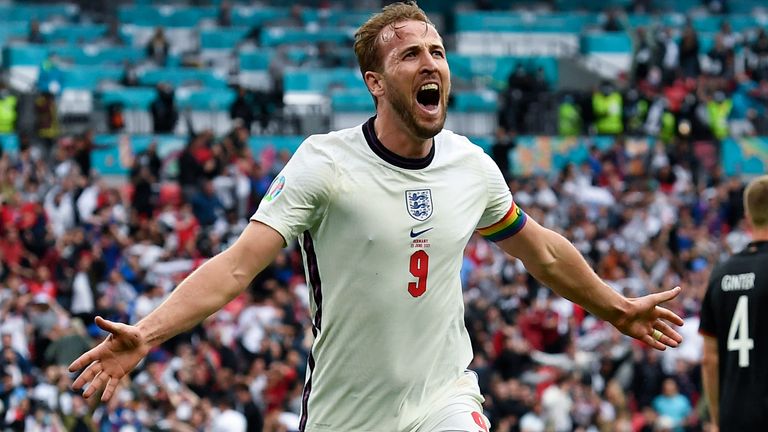
England captain Harry Kane after scoring against Germany at Wembley on 29 June
Football is a game involving balls but the key to this summer’s UEFA European Football Championship is money.
It was vividly expressed when Portugal’s captain Christiano Ronaldo moved bottles of Coca-Cola that been placed in front of him for a press conference.
At an earlier one, French midfielder Paul Pogba, who is Muslim and does not drink alcohol, moved a Heinken bottle out of camera shot. The brewer is the tournament’s official beer sponsor.
Players have now been instructed to stop infringing on sponsor’s rights
Euro 2020 tournament director Martin Kallen told a subsequent briefing that their support “…is important because the revenues of the sponsors are important for the tournament and for European football.”
There is a perversity in obliging some of the greatest footballers in history to subordinate themselves in the middle of a soccer tournament to the interests of drink manufacturers.
But they can’t complain. Ronaldo has built a business empire that has seen him make more than $1bn (£720m) from salaries, bonuses and commercial activities such as sponsorships — including from Coca-Cola.
These shenanigans are of little interest to football fans preoccupied with what happens on the pitch during games. But even here, money’s influence is irresistible.
UEFA has 55 members, more than twice the number of countries now in the EU. Its annual revenues of almost €3bn come from selling broadcasting and commercial rights to partners worldwide for various club and national team competitions. Around 75 per cent of that revenue is passed on to its members’ football clubs.
Those buying broadcast rights depend upon a combination of advertising and subscription revenue to recoup their costs. Ultimately, the whole UEFA model requires online and broadcast viewers in sufficient numbers to secure the requisite income.
This is football’s strength but also its weakness and probable downfall.
Teams and players people want to watch aren’t necessarily the best or the ones who win games. Weaker teams and underdogs regularly defy the odds.
The problem for UEFA is that obscure teams lacking famous players like Ronaldo and Pogba don’t attract viewers on the scale that famous ones with them do. It’s consequently in UEFA’s material interests to have a final between giants like France, Germany, Italy or Spain, not one involving Ukraine or Slovakia.
The tension between football and money is more obvious within FIFA, organisers of the quadrennial World Cup finals, to be held contrary to the logic most football fans recognise in Qatar next year. Their location, timing and structure are heavily influenced by what will make the most money.
FIFA employs match officials, though there’s no evidence (despite suspicions) that they are guided by a broader agenda than what’s happening in a game.
The pressures can be sensed in this year’s European championships. These are being distilled in the progress of England, due to meet Ukraine in the quarter-finals on 3 July in Rome.
England has consistently been an unpopular national team. This can be attributed to a number of factors: the legacy of imperialism, arrogance in a nation that invented the game, a reputation for playing unpolished football and having violent fans and the fact that the UK is permitted four national teams in UEFA and FIFA tournaments.
Despite having one of the largest communities of professional football players and hosting the world’s most popular club championship, England on the football pitch has been consistently unsuccessful. There’s been just one shining success: World Cup victory at Wembley in 1966 against West Germany.
England’s relationship with UEFA has been complicated by the UK’s decision to leave the EU and the fact that six of the 12 clubs that attempted to set up a rival club championship to UEFA’s are based in England.
But there are countervailing factors.
The first is that England delivers one of UEFA’s largest television audiences. If it got knocked out early as happened in 2016, the Euros would lose a substantial chunk of its viewers and associated revenue.
The second is that almost all England’s players are members of teams in the Premiership, a tournament that has a huge following outside the UK including in China. These viewers might be dispassionate about national teams but have strong feelings about players from clubs they back. Raheem Sterling, who scored three of England’s first four goals, plays for Manchester City, which is owned by Abu Dhabi. England captain Harry Kane plays for Tottenham Hotspurs. Fans of these clubs in Singapore might find themselves rooting for England because of them.
A third countervailing factor is England’s embrace of the Black Lives Matter (BLM) campaign and gay rights. It’s the only national team in the Euros always to “take the knee” and Kane’s armband in the game against Germany was in the rainbow colours of the LGBT flag. Many large corporations, particularly those based in the US, are working hard to be associated with both causes. England’s team is also ethnically-diverse.
The UEFA marketing team will also be conscious that sponsors want excitement around the tournament that generates global headlines. The final’s to be held at Wembley in London. England’s involvement would ensure a full-house and a passionate crowd. And it would also help consolidate UEFA’s reputation among British football fans, a key influence on the English clubs that initially backed the ESL.
So it can be said that for the first time that UEFA has an interest in England making it to the final of the Euros. Their opponents are likely to be Belgium, Italy or Spain. Those who continue to dislike England will happily get behind any of them at Wembley.
Football is a complex industry that’s struggling to hold its place in the affections of many. An exciting European Championship culminating in a spectacular final will be an antidote.
But the ultimate winner will be money and those who want more of it.